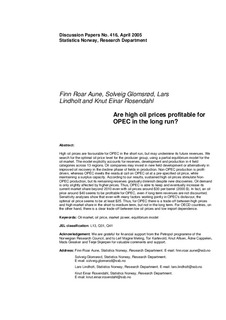| dc.description.abstract | High oil prices are favourable for OPEC in the short run, but may undermine its future revenues. We
search for the optimal oil price level for the producer group, using a partial equilibrium model for the
oil market. The model explicitly accounts for reserves, development and production in 4 field
categories across 13 regions. Oil companies may invest in new field development or alternatively in
improved oil recovery in the decline phase of fields in production. Non-OPEC production is profitdriven,
whereas OPEC meets the residual call on OPEC oil at a pre-specified oil price, while
maintaining a surplus capacity. According to our results, sustained high oil prices stimulate Non-
OPEC production, but its remaining reserves gradually diminish despite new discoveries. Oil demand
is only slightly affected by higher prices. Thus, OPEC is able to keep and eventually increase its
current market share beyond 2010 even with oil prices around $30 per barrel (2000-$). In fact, an oil
price around $40 seems to be profitable for OPEC, even if long-term revenues are not discounted.
Sensitivity analyses show that even with many factors working jointly in OPEC's disfavour, the
optimal oil price seems to be at least $25. Thus, for OPEC there is a trade-off between high prices
and high market share in the short to medium term, but not in the long term. For OECD countries, on
the other hand, there is a clear trade-off between low oil prices and low import dependence. | no_NO |
